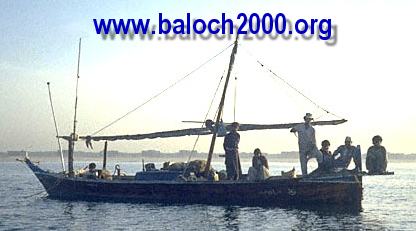 The word
Baloch is spelled in various ways such as Baluch, Balouch. The Arabs
call it Blushi or Al-Baloshi. There are certain unique features shared
by all Baloch. There are certain characteristics which have become the
hallmark and the distinguishing traits of the Baloch. Some of these
characteristics are: bravery, fearlessness, honesty, loyalty,
friendship, righteousness, sincerity,
integrity, unfussiness and simplicity. The Baloch nation is composed of hundreds
of various tribes scattered at various places. Individuals belong
to a particular tribe and are identified as such. The Baloch nation
consists of different ethnic groups who have their own language or
dialect. Hence, the word Baloch means Balochi people, Brahui people,
Kurds (Balochi Kurds), Jatts, Jadgals, and also black people of African
origin who are as Baloch as anybody else. Hence, Baloch does not have a
single racial connotation but refers to the people of Balochistan
including those who have migrated into the Balochistan and have adopted
Balochi Culture or those Baloch people who have migrated from
Balochistan or were thrown into exile by political upheavals.
The word
Baloch is spelled in various ways such as Baluch, Balouch. The Arabs
call it Blushi or Al-Baloshi. There are certain unique features shared
by all Baloch. There are certain characteristics which have become the
hallmark and the distinguishing traits of the Baloch. Some of these
characteristics are: bravery, fearlessness, honesty, loyalty,
friendship, righteousness, sincerity,
integrity, unfussiness and simplicity. The Baloch nation is composed of hundreds
of various tribes scattered at various places. Individuals belong
to a particular tribe and are identified as such. The Baloch nation
consists of different ethnic groups who have their own language or
dialect. Hence, the word Baloch means Balochi people, Brahui people,
Kurds (Balochi Kurds), Jatts, Jadgals, and also black people of African
origin who are as Baloch as anybody else. Hence, Baloch does not have a
single racial connotation but refers to the people of Balochistan
including those who have migrated into the Balochistan and have adopted
Balochi Culture or those Baloch people who have migrated from
Balochistan or were thrown into exile by political upheavals.
One might say that
Balochistan is the land of tribes. Because Baloch are of various tribes
and clans. Although, this concept is diminishing in its strengths, it
still exists in rural area and in the north of Balochistan. However in
the coastal region of Balochistan known as Makoran or Makkaran the
concept of tribe has long faded away. People of Makoran are not
dependent primarily on the land. Hence, the old tradition of land
ownership and caste system which goes with it does not exist. Makoranis
depend on the sea for living. They are involved in sea transport,
fishing, and trade with other countries. The Makoranis do not come from
a particular tribe or caste. There are ex-landlords, ex-slaves and many
others from various tribes and castes who are involved in fishing or sea
trade. The original people were called "Mead" that means
someone who earn his living through the sea and primarily by way of
fishing. Meads were very versatile and dynamic. They moved from one
coast to another. The sea was every where - from Bandar Abbas to
Karachi. The interesting fact about the Meads is that they had rejected
the back-ward and suppressive tribalism and the caste system long time
ago. Hence, they were, and still are, despised by the tribal
chiefs. The Meads or Makoranis are much more peaceful and non-violent in
comparison with the Baloch from the northern part of Balochistan who
seems to be warriors and much more angry with life. This difference in
temperament can be attributed to environment and brutal tribalism. The
environment in the south (Makoran area) is rather humid and constant.
There is no tribe to fight against. The northern part of Balochistan is mountainous
and wild with hot temperatures in the summer and very cold and some
times freezing weather in the winter.
Like every other nation
who has been suppressed and kept back-ward, Baloch are traditional in
the sense they are rather resistant to change. After all it was their
cultural cohesion that made them survive throughout centuries of brutal
and barbaric attacks and killings by outsiders. However, emphasis on
tradition should not portray a picture of Balochistan with nomads and
camels moving around and life as it was many centuries ago. Indeed
Balochistan, despites deliberate deprivation by the ruling governments
of Iran and Pakistan, is a modern place with all the facilities of
modern life. The Baloch are very hospitable, nice and friendly. They are
generally intelligent, learned, well-informed, initiated, cultivated,
socially accomplished and politically attentive. Culturally, they are
rich and self-dependent. The deliberate deprivation is a political tool
used by the central governments of Iran and Pakistan in order to ensure
Balochistan and particularly the Baloch people are kept back-ward, poor
and deprived. Positive discrimination against the Baloch is rampant in
every respects such as employment, land assignment, loan system,
education, health and sanitation. For example 90% of government
employees in Balochistan are non-Baloch. They have come from outside
Balochistan. The government provides them with accommodation, clean
water, free education and free healthcare. On the other hand the
deprived and poor Baloch must pay for his water ( buy it by the bucket),
education, health and so forth. The question is if he is unemployed, poverty-stricken,
poor, and destitute, how can he pay for all these facilities which are
available (in practice) only to non-Baloch. With such blatant
discrimination and prejudice backed by brutal force
against the Baloch, one should not be surprised to hear that the Baloch
are poor and back-ward.